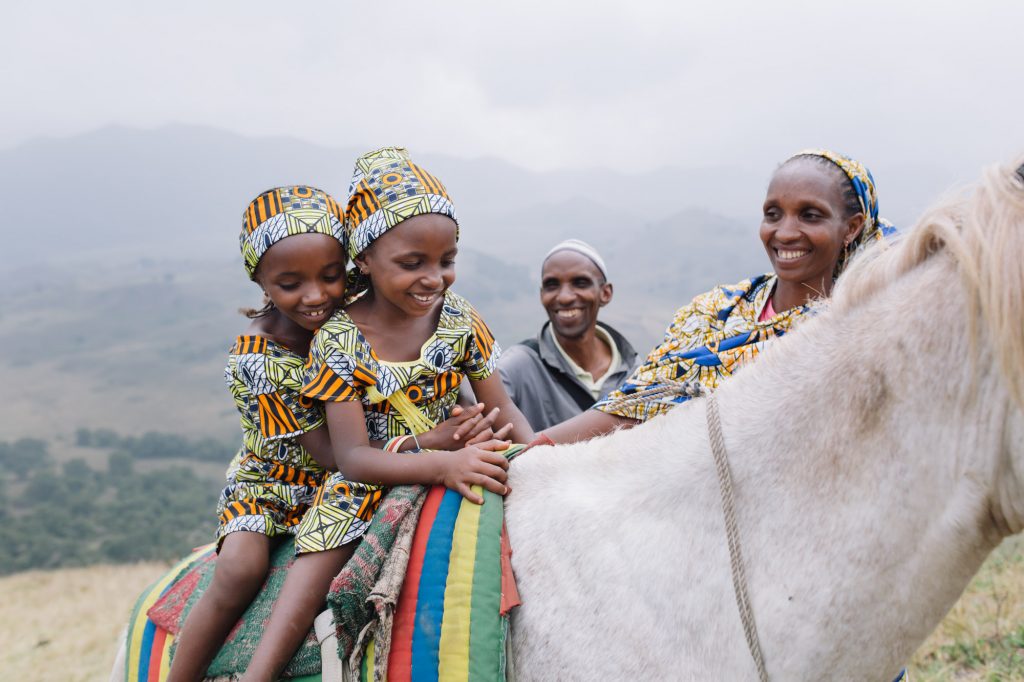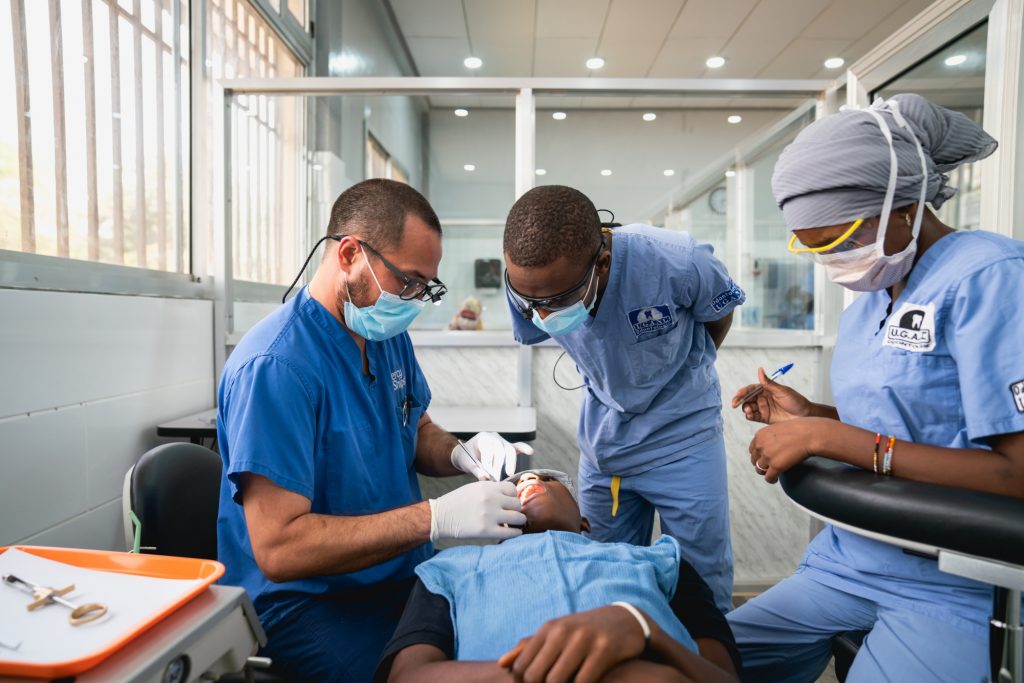Operating a fleet of floating hospitals means managing a host of moving parts. From building relationships with other nations to staffing a crew of volunteer professionals – and, of course, serving our patients – you might say the work on board a Mercy Ship requires a journey. Vessels moving from port to port. Volunteers travelling from their homes to our ships. And, of course, patients and caregivers finding their way on board from all corners of their country. What does travel mean to Mercy Ships? Let’s explore.

Salamatou and Mariama, sisters, on a horse with their parents near their village in Cameroon.
Travelling Far and Wide for Surgical Treatment
How far can you imagine travelling to receive healthcare?
For many of the patients we serve, access to care isn’t only limited financially – it’s also physically out of reach. Without trained medical specialists in the region, small issues can quickly grow into life-threatening conditions with no hope in sight.
When our ships sail into port for a 10-month field service, healing is finally within reach – but the journey often isn’t over there. First, Mercy Ships patient screening teams typically travel extensively across each nation in order to screen and select which patients can receive surgery on board. These upcountry screening trips often involve days or weeks on the road to reach patients in remote regions.
With a follow-up appointment scheduled, patients then make their way from their homes to the ship. Whether travelling down a mountain, through the country via public transport, or even across water, it’s not unusual for patients to come from faraway regions of the country to receive care.
Take sisters Salamatou and Mariama, for example, who lived in a mountainous village in Cameroon. Travelling to or from their village requires a steep ride on horseback surrounded by craggy rocks with only wildlife for company. It’s an epic journey — but because of their twisted legs, these two little girls had never left their village high in the hills.
The six- and eight-year-old sisters didn’t get the important nutrients they needed during crucial years of bone development. Without strong bones, the pressure of walking caused their legs to grow incorrectly, resulting in a condition called Valgus. Because of their malformed legs, they both found it difficult to walk to school, and only sometimes managed to attend. Their malnutrition, combined with an inability to access surgery, meant Salamatou and Mariama had to learn to cope with their twisted legs.
When their father, Debo, heard about Mercy Ships, he led his girls down the mountain on horseback, making the brave journey to the coast. They were grateful to have each other as they arrived at a ship they had only heard stories about.
“We didn’t know the hospital was actually in the ship. We’ve never been to a ship before,” said Debo. “When I first came I was afraid for my girls, but then I saw many children like them and the fear went away.”
“The route down the mountain was too much for the girls before, and I thought they would never go down. Their lives are far better now, far improved,” said Debo. “Now, they will be able to commit to school and use their education. Before, my heart was anxious for my family, but now I am content.”

Amadou and Malika, dental students, being trained by Dr. Dave Ugai at the Gamal Dental Clinic in Guinea.
Increasing Access to Care Long-Term
Sailing our ships into port for 10 months at a time is just one part of the equation. While we provide surgical treatment on board our hospital ships, we’re committed to training medical professionals capable of strengthening their own healthcare systems. Our goal is that in future generations, it won’t be necessary to travel hundreds of miles to receive care – rather, people in need will have adequate medical solutions much closer to home.
We’re not alone in this goal. The desire to bridge the gap between remote patients and quality care guides many of the participants we train, like Amadou, one of the students in the dental training program at Guinea’s Abdel Nasser Gamal University. He decided to study dentistry after realising the need for properly trained dentists in his rural home region in Guinea. After earning his degree in dentistry, Amadou’s dream is to use his training to serve those who can’t access care: “I hope to one day go to the most remote villages to share my experience and bring care to the most disadvantaged.”
Travelling to Bring Safe Surgical Training
While our ships remain docked in port during each field service, many of the volunteer teams on board are far from stationary. In fact, our volunteers travel across our host nations to make surgical care and medical training is accessible as possible. One such group is our WHO Safe Surgery Checklist team, who may spend weeks at a time travelling throughout our host nations to bring medical training to local hospitals. The task? Working with hospital staff to deliver multidisciplinary checklist training, a tool that has been shown to improve surgical outcomes and patient safety by reducing mortality and morbidity. The end result is a long-lasting impact that requires minimal resources or training. None of it would be possible without their willingness to travel and bring medical training directly to those who need it.
Join Us in Sharing Hope and Transforming Lives
Receiving hope and healing is a journey. From the patients and caregivers to healthcare partners and participants, accessing quality care and training usually involves travelling. And of course, we need professionals willing to volunteer their time to make these vital healthcare services possible. It takes more than nurses and surgeons – we also need vehicle mechanics, maritime crew, engineers, housekeeping staff, and so much more.
If you’re drawn to adventure and want to use your skills to make a difference, find your place on board today!
Recent Comments